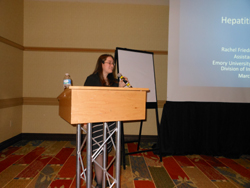Hemophilia Treatment Staff Comes Together at 2015 State Meeting
By Michelle Putnam, Associate Director of Research and Advocacy
Each year, members of Georgia’s Hemophilia Treatment Centers gather at the Hemophilia State Meeting to share new research, improve care, and overcome challenges in the bleeding disorder comm unity.
unity.
We couldn’t begin this meeting without first acknowledging the service and commitment of Trish Dominic. As CEO of Hemophilia of Georgia, Trish attended state meetings for well over a decade, and she understood the importance and power of sharing knowledge in order to improve access to care and treatment. Although this was her last State Meeting before her retirement, her commitment to collaboration is a legacy that will stay with us.
Whereas most conferences and meetings focus on a particular track, whether it is research, policy or insurance, our State Meeting was all-inclusive. We began the day with Dr. Robert Sidonio, Jr., from Emory, who shared his research on bleeding tendencies in carriers. Specifically, he shared that testing of symptomatic carriers is important, specifically before life events like menstruation, pregnancy, or surgery.
F rom there, we moved on to management of Hepatitis C, an area that has seen many changes since the market introduced new medications to treat the condition. Dr. Rachel Friedman-Moraco with Emory University discussed new findings in determining how best to treat people with HCV based on their diagnosis. Although new treatments can be very expensive, they do result in less harmful side effects than previous drugs, moving us further into the realm of an accessible cure for many people living with Hepatitis C.
rom there, we moved on to management of Hepatitis C, an area that has seen many changes since the market introduced new medications to treat the condition. Dr. Rachel Friedman-Moraco with Emory University discussed new findings in determining how best to treat people with HCV based on their diagnosis. Although new treatments can be very expensive, they do result in less harmful side effects than previous drugs, moving us further into the realm of an accessible cure for many people living with Hepatitis C.
Of course, physical health isn’t the only topic discussed at State Meetings; mental health issues are also important to continued care and treatment, specifically for young people. Sometimes, having a bleeding disorder can make our youth feel different. As a team, we watched and discussed “Bully,” a documentary that addresses the subject of bullying in schools and how the community can help.
Bullying isn’t the only thing that can lead to stress. Understanding the health insurance market can lead many of us into a stressful spiral. Fortunately, we had Michelle Fitzwater, Gail Day, and Michelle Putnam from HoG to guide us through changes in the insurance market, including the Health Marketplace, the state Medicaid program, and employer-sponsored plans.
Our Director of Social Work, Gail Day, continued her educational piece with information about the Preventive Dental Care program that covers the cost of two dental cleanings per year for those in financial need.
Gladys Lee discussed how Emory’s research team can best support clinical research projects, ensuring not only quality projects, but incorporating those results into improved care. Her work will make certain that new discoveries make their way out of research labs and into the minds of the rest of the care team, such as nurses and social workers.
Our Camp and Activities Coordinator, Kim Williams, followed up with key ways to improve developmental relationships between young people. Adults, whether they are family members or other members of the community, must show young people that they are cared for, but they also have to inspire and challenge them. This can happen by providing support for a young person’s activities or interests and by also respecting his or her needs.
Dr. Christine Kempton and Shanna Mattis from Emory presented a new program called TRANSIT that they are creating to help empower youth. This online platform will assist young people in transitioning into adulthood and managing their own care. It will equip them with the skills and knowledge they need in order to maintain access to care and treatment.
Throughout the rest of the afternoon, social workers and nurses, including Laura Roberts, Mary Ann McCullough, Betsy Kovak, and Maggie Evans, along with Dr. Bobby Tran, discussed the challenges they have come across in providing support to people with bleeding disorders. Dr. Glaivy Batsuli and Kelly Tickle shared their experience in diagnosing a very rare bleeding disorder. Sharing best practices in addressing hurdles in the health care system equips our social workers and nurses with the ability to quickly solve problems that they may face in the field. It is only with a full support team that we can ensure that people with a bleeding disorder don’t forego care or services when they most need them.
The common denominator to all of this, however, is the community. Research and improvement in care move forward not only because of the dedicated doctors, nurses, and social workers that make up our hemophilia treatment centers, but because of the involvement of people with bleeding disorders. At the end of the day, the State Meeting is about making sure that we’re doing everything we can to improve the treatment and the lives of Georgians living with bleeding disorders.
